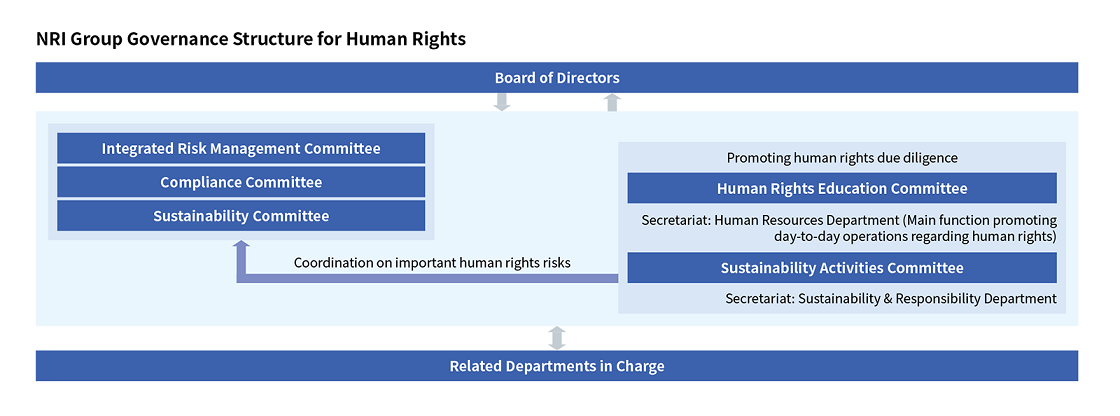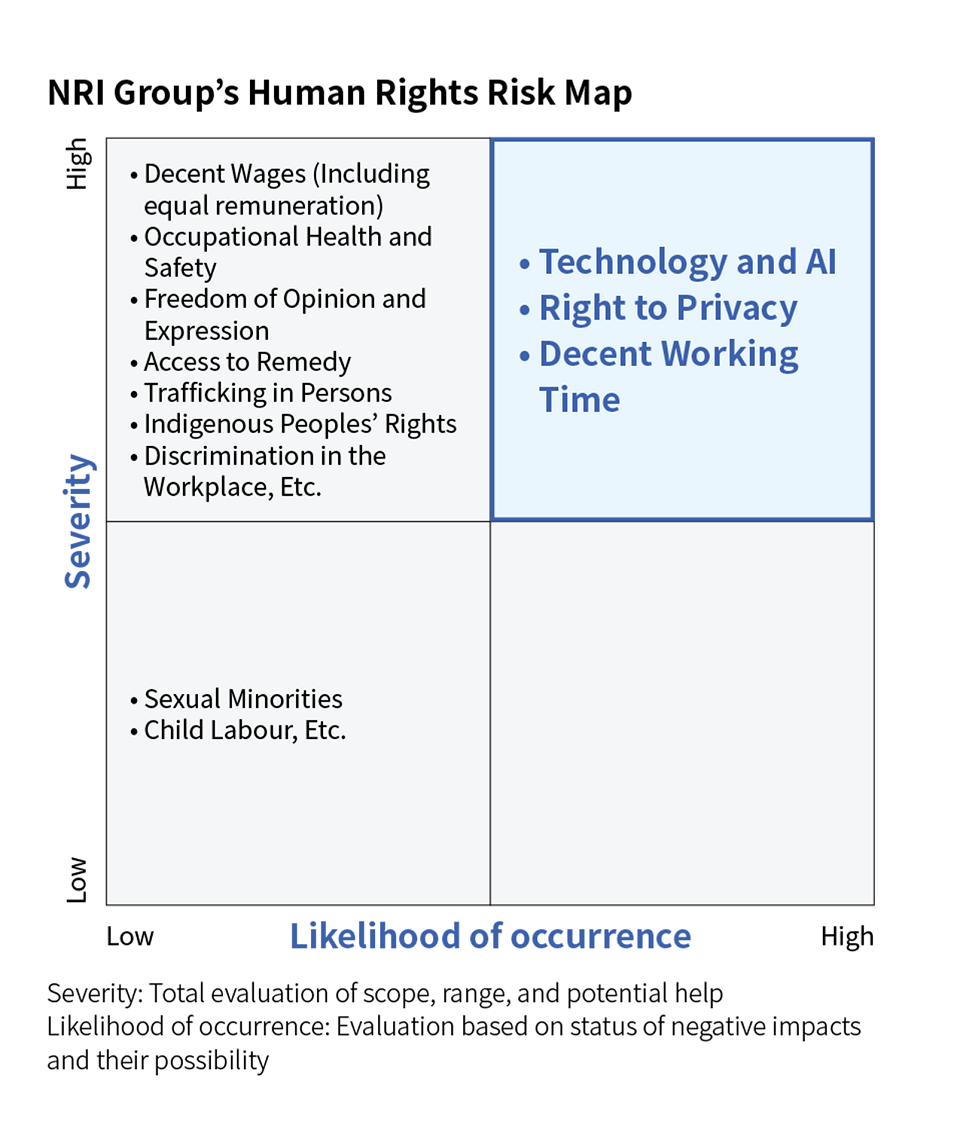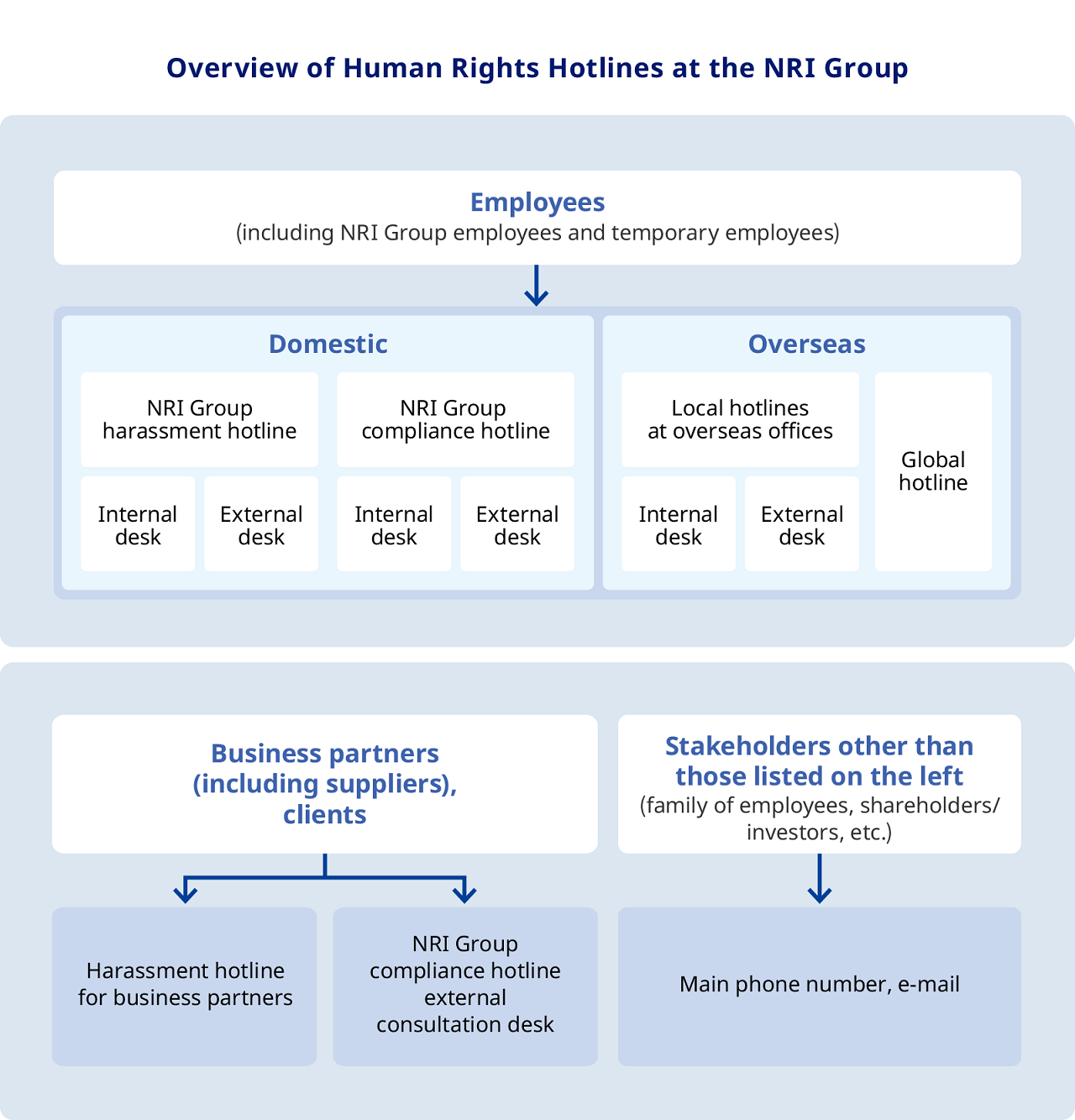The NRI Group recognizes that understanding the impact of business on human rights and conducting business activities with a strong commitment to human rights is essential to building a sustainable society. Based on international standards, such as the "International Bill of Human Rights," "ILO's Core Labor Standards," and the "UN Guiding Principles on Business and Human Rights," we are actively undertaking initiatives to promote respect for human rights.
Human rights policy
NRI Group Policy on Human RightsGovernance
The NRI Group governance structure for human rights is as follows.

Human Rights Due Diligence
Human Rights Risk Assessment
The NRI Group has established a framework for conducting human
rights due diligence, in accordance with the procedures outlined
in the UN Guiding Principles on Business and Human Rights.
In the fiscal year ended March 2024, NRI conducted a human
rights risk assessment in collaboration with external experts and
Verisk Maplecroft*1, which provides globally recognized human
rights risk assessment methods, and identified the potential
risks that the business activities of the NRI Group may have on
human rights.
In addition, to conduct industry-based risk analysis, we utilize
the database of RepRisk*2, the largest ESG technology company
in the world.
Using these risk analysis methods, NRI identified technology
and AI, right to privacy, and appropriate working hours as significant
human rights risks.

- *1
Verisk Maplecroft: A leading company in risk analysis, research, and strategic forecasting. It provides data-driven solutions and advice on the impact of political, human rights, economic, and environmental risks on organizational resilience and sustainable procurement.
- *2
RepRisk is the pioneering company in ESG data science, which utilizes AI and machine learning in combination with human intelligence to systematically analyze disclosed information and identify important ESG risks. The RepRisk ESG risk platform is the largest ESG risk database in the world.
Human Rights Impact Assessment
In response to the potential risk assessment results, NRI has begun understanding the actual situation of NRI, its
Group
companies, and business partners (including contractors, staffing agencies, and suppliers) since the fiscal year
ended
March 2020. In understanding the actual situation, we formulate survey items and methodology based on expert
advice, and review these based on laws in various countries and regions and an understanding of the internal and
external environment.
From the fiscal year ended March 2024 to the first half of the fiscal year ending March 2025, Self-Assessment
Questionnaires
(SAQ) were distributed to NRI and its Group companies to assess the risk situations within NRI and its Group
companies.
In addition, on-site interviews were conducted at multiple locations. We have reviewed the human rights
themes based on the results of these surveys and the human rights risk assessment.
Based on the results of human rights due diligence from the fiscal year ended March 2024 to the first half of the
fiscal
year ending March 2025, we set three new human rights themes for the NRI Group to focus on, which are technology
and AI, right to privacy, and appropriate working environment.
Mitigation Measures for Human Rights Risks
Efforts to Address Risks in Utilizing AI
Of the themes identified in the human rights risk assessment and impact assessment, we are promoting efforts to
address the risk of using AI, as part of mitigation measures regarding technology and AI.
have negative impacts, NRI recognizes the obligations regarding promotion of the research, development, and use of
AI
and believes it important that AI is appropriately adopted and utilized in its business activities. That is why NRI
has
formulated the NRI Group AI Policy for promoting the research, development, and use of AI while countering new
risks,
as indicated below. In order to further increase the effectiveness of this policy, we also build and operate AI
governance
processes and strive to use fair and wholesome AI.
Efforts Related to an Appropriate Work Environment
Of the themes identified based on our human rights risk assessment and impact assessment, we are implementing
corrective
measures for ensuring an appropriate work environment, and will continue to address employee work hours
and health and harassment issues via efforts across the entire company.
Domestically, in regard to employee work hours and health, NRI has been aiming to realize health and productivity
management to contribute to employee quality of life (QOL) since FY2015 by reducing lifestyle diseases and promoting
work-life balance. In regard to harassment, unconscious bias training is mandatory for all employees, and we also
provide
department heads and general managers (section managers) with information on how to report and respond to
bullying and harassment cases.
We are also promoting initiatives at all of our overseas offices in accordance with the laws, environment, and
conditions in each country.
Response to Consultation and Report on Human Rights
The NRI Group has established human rights hotlines for consultation/reporting to offer swift and direct help to
those
negatively impacted in terms of human rights.
Each of these hotlines strictly upholds the privacy of the reporters and enables the relevant departments to
coordinate
in order to respond appropriately. If compliance violations or other violations are suspected via routes other than
the hotlines below, we will investigate and respond accordingly.
The status and results of consultations are handled by the Compliance Committee and departments in charge and
reported to the president & CEO.
In the future, we will validate the effectiveness of our systems and improve our efforts from the perspective of
grievance
mechanisms as required by the UN Guiding Principles for Business and Human Rights.
